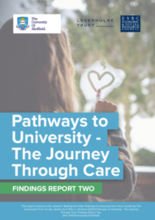Displaying 251 - 260 of 2221
This paper aims to describe how a sense of normalcy for young people in foster care can be critical to their well-being.
This paper discusses how research related to youth with experience in foster care can be conducted in an emancipatory manner with researchers actively supporting the liberation of youth with experience in foster care through their scholarly contributions.
The overrepresentation of black children in the foster care population represents massive state supervision and dissolution of families concentrated in their neighborhoods. This chapter from Racial Disproportionality and Disparities in the Child Welfare System addresses the social impact of this concentration of child welfare agency involvement on the residents who live in these neighborhoods.
This chapter from the book Racial Disproportionality and Disparities in the Child Welfare System explores disproportionality and disparities of Asian American and Native Hawaiian/Pacific Islander in the child welfare system.
This chapter from Racial Disproportionality and Disparities in the Child Welfare System explores the factors contributing to the disproportionate number of Black children and families in the U.S. child welfare system.
This chapter from Racial Disproportionality and Disparities in the Child Welfare System focuses on the macro level exploring the child welfare system as an explanatory factor using a critical race theory lens.
Through careful ethnography and rich in-depth interviews at a non-profit foster care agency, this book takes a look behind the scenes of the U.S. foster care system.
Using survey data provided on youths’ social networks, this study identified 378 informal mentoring relationships provided to 113 former and current foster youth preparing to enter a four-year university.
The authors of this study conducted research with 234 care experienced university students in England and Wales to explore their experiences of the journey through care.
In this study, data derived from 17 qualitative face-to-face interviews are used to explore the lived experiences of Indigenous mothers affected by domestic and family violence (DFV) in Australia.

